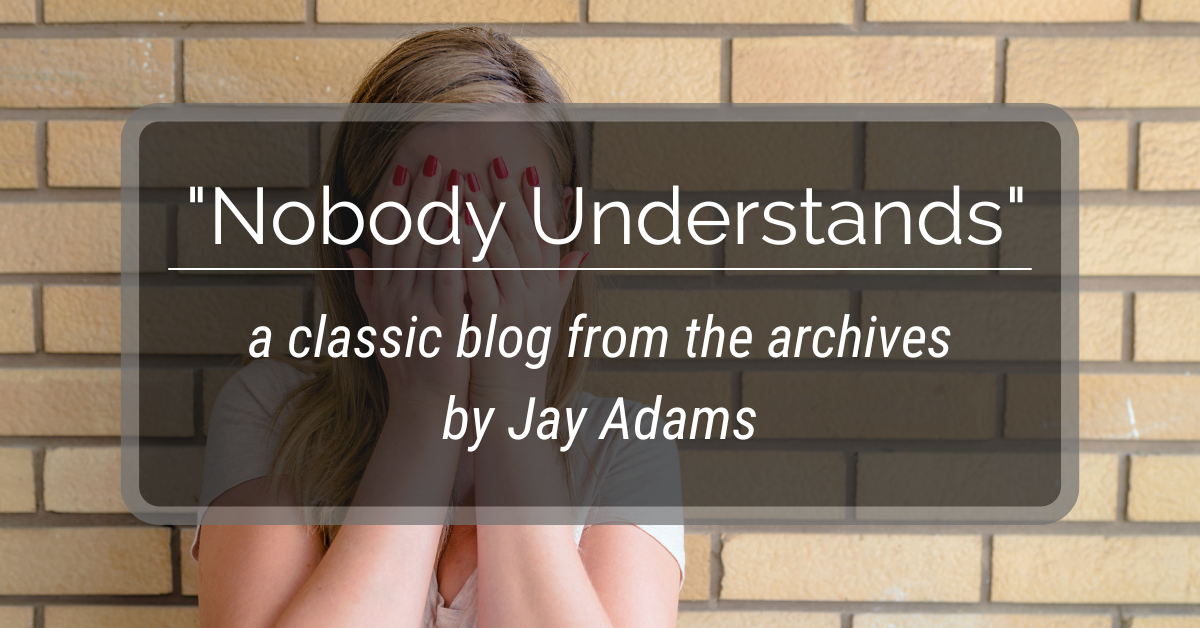You’ll hear those words over and over again in counseling. They, of course, are untrue. The person making that statement may actually believe he is telling the truth. If he does, it can be as devastating for him as if he were correct. He must be convinced to think otherwise. That may be your task as a counselor.
But, to begin with, let’s consider how any believer can use such language of exaggeration. Doesn’t he know that God understands? Several things have probably happened in his past. First, something very difficult to handle has come into his life. Next, he has handled it poorly, perhaps even complicating matters. Thirdly, all the past advice he has received has not helped either. Finally, people have really given up on him since all he does is whine. They dare not even ask him, “How are you today?” without receiving a recital of his problems.
That, or a similar series of events, doubtless has occurred. The specifics are not important at the moment. But there is more. He has begun to say the words quoted in the title. He says them over and over again—verbally to others and quietly to himself. Combined with the previous failures, this mournful recital has, after a time, gained firm footing in his thinking. Some people often tend to believe others too readily, others are skeptical about what they are told, but there is one person that we almost always believe—ourselves! Because he has recited this mantra often enough he has come to believe it.
What can be done about this situation, counselor?
Well, like all other misbeliefs—particularly those having to do with a person’s concept of himself—it will be necessary to disabuse him of the idea. If you attempt to counsel a person caught up in this kind of thinking, you’ll probably get nowhere until he abandons the belief. So, to help him do so, and to give him genuine hope, will be your first counseling assignment—before tackling any other.
How can you instill hope in him? You will not do it by telling him to “buck up,” or by some similar approach. You will not help him if you go along with his laments. You will certainly not help matters by becoming empathetic. So, what will you do?
You will become more deeply empathetic than even he expects. If empathy means entering into another’s situation so as to understand it, and to feel something of his distress, then what I am talking about is quite different. I am suggesting empathetic disagreement.
“What is that? I thought the core of empathy is to so agree that one enters into the problem just as the counselee does.”
Yes, that’s what empathetic agreement is like. You are quite right.
“Well, then, tell me what this empathetic disagreement is like. How does it differ—except in nomenclature?”
Gladly. When a counselor enters into his counselee’s problem only so far as to co-miserate with him, he merely wallows in the mud alongside of him. The one who enters into it further, sees not only the problem, but also God’s solution to it! That’s the difference. And what a difference it is!
The biblical counselor may experience much of the pain of his counselee; if he cares, he probably will. But he doesn’t merely sit there together with his counselee, singing the blues—he says, “Yes it’s serious” (and goes on to express those thoughts which reveal the fact to his counselee that he does understand his plight). However, he doesn’t pause there. He goes further, saying, “yes, I can see that your problem is such and such, but . . .”
That “but” is what makes all the difference.
When you say “but,” and follow it with an adequate biblical response, you have penetrated more deeply into the problem than your counselee. He sees only the problem; you see not only the problem, but also God’s solution. That is what makes the difference.
Because you have empathized enough for the counselee to understand that you truly do recognize the true depths of his situation, he will be ready to hear you when you offer God’s way out of the problem. If, on the other hand, you had minimized it (“Oh, come on Mike; things can’t be that bad”), he would not listen. He’d not hear you because he’d only say to himself once again, “Nobody understands!” Why not become the one who does—fully enough to disagree with him?
Check out our online courses, including, Introduction to Nouthetic Counseling and The Use of Scripture in Counseling, taught by Jay Adams!
Books related to counseling others:
- Competent to Counsel by Jay Adams
- The Christian Counselor’s Manual by Jay Adams
- How to Help People Change by Jay Adams
- Check out our Bookstore for all the best counseling books!
The Christian Counselor’s New Testament and Proverbs, translated by Jay Adams
Visit our online bookstore for all your biblical counseling resource needs.
For more biblical counseling training, check out our list of INS Online Courses.
Follow INS on Social Media:
– Facebook: noutheticstudies
– Twitter: @noutheticstud
– Instagram: @noutheticstudies

